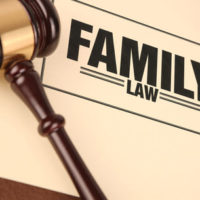
Ability to Pay Child Support
 Failure to pay child support in North Carolina may result in a Show Cause Order and Civil Contempt proceedings.
Failure to pay child support in North Carolina may result in a Show Cause Order and Civil Contempt proceedings.
Once entered, the Burden of Proof shifts, requiring the defendant/respondent to show why he or she should not be held in civil contempt of court.
Family law attorneys may refer to that person as the “contemnor.”
That traditionally has been a substantial burden, involving evidence of the ability to pay, and possibly more importantly, the inability to pay child support – Bill Powers, Charlotte Divorce Lawyer
Under the NC divorce laws, there cannot be a default judgment of sorts. The respondent contemnor may not be held in civil contempt by default.
Evidence must be introduced indicating the actual, present ability to pay child support. Indeed, the failure of the respondent to appear at the hearing is not deemed a “waiver.”
And as such, the family court judge is not relieved of the duty to make appropriate findings of fact that specifically address a present ability to pay.
Present ability to pay Child Support
A legal ruling by a District Court Judge in NC cannot be conclusory in nature without proper evidence before it. Conclusions of law, supported by sufficient findings of fact, must involve taking an inventory of sorts.
The Court must consider the responding party’s present financial condition.
Any such analysis of financial condition necessarily requires the present ability to pay. Changes in financial condition are therefore relevant and may indeed prove dispositive.
That can be frustrating, especially in circumstances where a substantial defense may be mounted by simply refusing to attend the hearing.
One would have to assume this will add to the complexity of family law litigation. It will be interesting to see how the trial courts interpret the gentle reminders of the Court of Appeal on child support and contempt issues – Bill Powers
What is a purge condition?
Anyone familiar with family court proceedings is familiar with compliance with a child support order and payment of the outstanding balance immediately prior to the hearing relating to the show cause contempt proceeding.
A civil order may be “purged” by coming into immediate compliance with the Court’s Order. In family court, upon a finding of willful contempt of court, the Judge normally sets “purge conditions,” providing the opportunity to purge the contempt.
Relative to contempt of court for child support, the judge is required to fully consider both sides of the present financial condition. A proper financial inventory demands balancing assets available to pay child support, income or lack thereof, and the reasonable needs of the responding parent.
That includes subsistence needs such as housing, food, use of a vehicle, and day-to-day living expenses. (FWSC – Food, Water, Shelter, Clothing)
The court must therefore also take into consideration income, the ability to work, and the willfulness of the lack of employment.
NC Child Support Laws – Ability to Pay
The family court judge must consider and balance both sides of the financial equation. The defendant’s living expenses are therefore an important part of any ruling on contempt of court for nonpayment of child support.
A responding parent’s reasonable and legitimate expenses are key considerations. The present ability to pay, to meet the purge condition (or purge conditions), requires balancing the remaining funds available after meeting the reasonable personal needs and expenses of the responding parent.
Ability to Work and Willful Unemployment
An absence of evidence is not necessarily the evidence of absence. The Court cannot draw a negative inference from the lack of evidence relative to the ability to pay.
The Court must have proper evidence before it. Lack of evidence will cause problems – Bill Powers, Family Law Attorney
Conclusions of law, predicated on improper findings, will be reversed by our appellate courts. The ability to work refers to the present ability to maintain a wage-paying job.
That does not necessarily mean one’s chosen profession or preferred method of employment. The court is the sole judge of the credibility of witnesses. Lack of credibility, standing alone, is likely not enough.
Charlotte divorce attorney – Bill Powers
If you have questions about past-due child support or a pending show cause Order in Mecklenburg County, please call now: 704-342-4357. You may also reach Bill Powers at Bill@CarolinaAttorneys.com
Learn More
The Legalities of Same-Sex Marriage in North Carolina
 The applicability of federal law in a country where each state is its own sovereign can cause some complexity for issues such as same-sex marriage. Marriage is under the ambit of state law, however, where the federal law interprets state law as a violation of constitutional rights, states must yield to the federal interpretation of the law. Same-sex couples seeking to marry have to gain a clear understanding of the marriage laws governing their jurisdiction. North Carolina is an example of a state where some complexity exists.
The applicability of federal law in a country where each state is its own sovereign can cause some complexity for issues such as same-sex marriage. Marriage is under the ambit of state law, however, where the federal law interprets state law as a violation of constitutional rights, states must yield to the federal interpretation of the law. Same-sex couples seeking to marry have to gain a clear understanding of the marriage laws governing their jurisdiction. North Carolina is an example of a state where some complexity exists.
Same-Sex Marriage Under Federal Law
To fully understand state law, individuals must understand its relationship to the federal law. On June 26, 2015, same-sex marriage was pronounced as legal nationwide in the landmark case of Obergefell v. Hodges. In that case, the Supreme Court of the United States held that same-sex marriage was a guarantee under the Due Process Clause and Equal Protection Clause of the Fourteenth Amendment of the Constitution. With this ruling, same-sex marriages were recognized in all 50 states and Washington D.C. As of today, about seven counties in Texas and Alabama do not issue marriage licenses to same-sex couples.
North Carolina’s Same-Sex Marriage Laws
In North Carolina, same-sex marriage has been recognized since 2014 after the ruling in General Synod v. Cooper. In that case, the U.S. District Court held that a denial of marriage rights to same-sex couples in North Carolina was unconstitutional. Therefore, North Carolina permitted same-sex marriage before the Supreme Court handed down the federal ruling in Obergefell v. Hodges. Prior to the Cooper ruling, North Carolina had a statutory ban on same-sex marriage that passed in 1996. In 2012, the North Carolina legislature amended the state Constitution with marriage defined as a union between man and woman. After the ruling in Cooper and Obergefell, the 2012 statutory pronouncement is no longer applicable in North Carolina. It is important to note that North Carolina recognized (and still recognizes) domestic partnerships between same-sex couples.
Recent State Bill Introduced Against Same-Sex Marriages
On April 11, 2017, the North Carolina House of Representatives introduced a bill entitled the “Uphold Historical Marriage Act” also known as House Bill 780. The bill sought to recognize marriage as only between a man and woman as pronounced in the 2012 amendment to the state constitution. The bill directly undercuts the ruling in Obergefell, which gives credence to opponents who call the bill “null and void.” The bill has not passed the North Carolina state legislature as of March 2018. Presently, same-sex marriage remains lawful in North Carolina.
Charlotte Same-Sex Marriage Attorneys
Although same-sex marriage laws are permitted in the U.S., some couples still face challenges when it comes to divorce and child custody. Similarly, there is some complexity when same-sex couples that have been cohabitating for years without marrying seek to have their relationship recognized under the law. The experienced lawyers at Powers Landreth PLLC will advise you on your same-sex marital matters to prepare you for the road ahead. Contact us now for a consultation.
Resources:
supremecourt.gov/opinions/14pdf/14-556_3204.pdf
altoday.com/archives/17555-two-years-later-7-alabama-counties-still-not-issuing-marriage-licences-sex-couples
ncleg.net/Sessions/2017/Bills/House/PDF/H780v0.pdf
washingtonpost.com/news/post-nation/wp/2017/04/12/north-carolina-bill-banning-same-sex-marriage-again-wont-be-heard-house-speaker-says/?utm_term=.d1bbdd1ed76f
clearinghouse.net/chDocs/public/PB-NC-0006-0011.pdf
Learn More
Why Did I Get Married? Annulment Basics in North Carolina
 Annulment is the legal procedure that declares a marriage void from its inception. The marriage is deemed as illegal when it was pronounced, therefore, the effect of an annulment is retroactive invalidity. Annulment is granted on varying grounds depending on the state at issue including insanity, bigamy and incest.
Annulment is the legal procedure that declares a marriage void from its inception. The marriage is deemed as illegal when it was pronounced, therefore, the effect of an annulment is retroactive invalidity. Annulment is granted on varying grounds depending on the state at issue including insanity, bigamy and incest.
Voidable vs. Void Marriages
Under North Carolina law, a marriage is that void is subject to annulment. In the alternative, a marriage that is voidable is a marriage that is entered into with a major defect including: (1) incest, (2) false pretenses, (3) impotence, (4) lack of sound mind, and (5) one of the spouses being under the age of sixteen. All of these instances are grounds that the court will consider as voidable. Unlike void marriages, a court can deem a voidable marriage as valid depending on the circumstances of the case. For example, in the case of false pretenses, if you remain married after you discover that your spouse was never pregnant (as was communicated before the marriage), then a court can find validity under the rationale that the pregnancy was not the actual reason for seeking the annulment.
One Annulment Ground in North Carolina
In North Carolina, the only ground for an annulment or void marriage is bigamy. Bigamy is the illegal act of marrying an individual who is already lawfully married to another individual. People who enter into bigamous marriages have entered into a void marriage per the law in all U.S. states. Bigamy, unlike the voidable grounds, is immediately void and the marriage is never valid under law.
How to Get an Annulment in North Carolina
Individuals seeking an annulment must file a claim for absolute annulment. The plaintiff spouse must file the claim in the county in which the defendant spouse resides. The more specific evidence and firsthand witness testimony the plaintiff shows, the more likely the annulment will be granted. With bigamy being the only ground for an annulment, plaintiffs are better served by providing solid evidence of the defendant’s marriage including marriage certificates, photos, or proof of children born of the first marriage.
Effect of a Void Marriage
In divorce proceedings, the individuals are considered as divorced after a divorce decree is issued. Under the law, the parties where married and the decree is the legal recognition of the dissolution of the marriage. After an annulment is granted, the marriage is deemed as to have never existed. You were and are currently single. However, children born to an annulled marriage are considered children of a valid marriage for the purposes of child support and parenting. Unlike divorce, property distribution and spousal support are not available in annulment proceedings.
Charlotte Annulment Attorneys
It is important to involve an experienced attorney to guide you through filing for an annulment or ending your voidable marriage. Annulment and voidable marriages are complex issues, but the Charlotte family law lawyers at Powers Landreth PLLC are ready to simplify the process and provide you with ardent representation. Timely filing of these claims will dictate your success. Contact us now for a consultation.
Resource:
ncleg.net/EnactedLegislation/Statutes/HTML/BySection/Chapter_51/GS_51-3.html
Learn More
What You Need to Know About Domestic Violence Protective Orders
 In North Carolina, a domestic violence protective order (DPVO) is a civil relief that is filed in district court. It permits the court to order an alleged abuser to do or refrain from doing certain acts as it relates to the plaintiff. Obtaining a DPVO requires the plaintiff to show that domestic abuse is being committed. In addition, the plaintiff must show a present or past personal relationship between themselves and the alleged abuser (among other requirements). The process for obtaining a DVPO has been streamlined for average citizens to take advantage of it to protect themselves.
In North Carolina, a domestic violence protective order (DPVO) is a civil relief that is filed in district court. It permits the court to order an alleged abuser to do or refrain from doing certain acts as it relates to the plaintiff. Obtaining a DPVO requires the plaintiff to show that domestic abuse is being committed. In addition, the plaintiff must show a present or past personal relationship between themselves and the alleged abuser (among other requirements). The process for obtaining a DVPO has been streamlined for average citizens to take advantage of it to protect themselves.
How to Obtain a DVPO
A plaintiff must go to their district court to file DVPO forms. If the plaintiff requires filing outside of business hours, they may go to a magistrate. If the plaintiff requires an emergency filing, then the DVPO may advance as an ex parte filing. The ex parte filing will apply for a temporary order, and will not require the presence of the alleged abuser when the temporary order is issued. The DVPO also provides for temporary custody by the plaintiff if there are children involved. In addition, the alleged abuser must surrender all firearms. There are no fees associated with filing a DVPO in North Carolina. After filing for the DVPO, the plaintiff must take the forms to the sheriff’s department. In turn, the sheriff’s department will serve the defendant with the complaint and a summons to appear in court. Thereafter, a hearing is scheduled on the merits of the case where the plaintiff must show evidence that the alleged abusive acts were actually committed.
DVPO Requirements
To obtain a DVPO, the plaintiff must show domestic violence from an individual with whom the plaintiff has a personal relationship. In North Carolina, domestic violence is defined as attempts to cause bodily injury; intentionally causing injury; imminent fear of serious bodily injury; continued harassment that causes emotional distress, etc. These actions include those that are inflicted on a minor. In addition, teenagers who are under the age of 18 may have their parents or guardian file the DVPO on their behalf. The personal relationship requirement is widely construed to include spousal, familial, roommate and dating relationships.
The Effect of a Standing DPVO
The effect of a standing DVPO is wide-reaching. A judge can order the defendant to do certain acts and/or refrain from doing certain acts, including:
- Order the defendant to refrain from assaults, threats and harassment
- Require that law enforcement remove the defendant from a shared home
- Order the defendant to stay away from the plaintiff’s home, school or place of work
- Order the defendant to make support payments
- Order the defendant to forfeit any firearms or other weapons
- Any such order as the judge may see fit for the situation
North Carolina Domestic Violence Lawyers
Domestic violence is a serious matter. To be sure, these matters are some of the most volatile legal issues in the realm of family law. The attorneys at Powers Landreth PLLC have years of experience dealing with North Carolina domestic violence laws and DVPO issues. We know that keeping you and your family protected is top priority. As such, it is imperative to seek the assistance of an experienced DVPO attorney.
Resources:
nccourts.org/forms/Documents/696.pdf
ncleg.net/enactedlegislation/statutes/html/bychapter/chapter_50b.html
Learn More
Consider These Seldom-Discussed Separation Agreement Terms
 A separation agreement is usually the first legal instrument a divorcing couple will agree upon. Although the parties are still legally married, the separation agreement mandates and directs the affairs of the parties while they are living separately. The agreement is crucial as it can set the tone for the final agreement that is incorporated into the divorce decree. Parties should be hard-pressed to agree to terms that are the most fair to their wants and needs. There are a few important terms that are seldom discussed when one thinks of a separation agreement. These terms can also be some of the most contentious during divorce proceedings. It can also make for a speedy proceeding if the parties are able to decide on them during the separation phase.
A separation agreement is usually the first legal instrument a divorcing couple will agree upon. Although the parties are still legally married, the separation agreement mandates and directs the affairs of the parties while they are living separately. The agreement is crucial as it can set the tone for the final agreement that is incorporated into the divorce decree. Parties should be hard-pressed to agree to terms that are the most fair to their wants and needs. There are a few important terms that are seldom discussed when one thinks of a separation agreement. These terms can also be some of the most contentious during divorce proceedings. It can also make for a speedy proceeding if the parties are able to decide on them during the separation phase.
Living Arrangements
During a marriage, most couples will purchase a house together and share joint ownership. A house may be the largest and most expensive asset a couple may own. During separation, one spouse usually has to leave the marital home. If the parties are financially stable, they can agree to keep the home and one party can obtain a separate dwelling place. Some parties may agree to sell the home and share the profits. If both parties have practical, emotional or financial attachments to the home, the may both decide to remain in the home for the duration of the divorce proceeding. In this instance, the parties would be wise to include terms regarding the rules of cohabitation during separation.
However, parties who are divorcing in North Carolina must live separate and apart to qualify under the one-year of separation divorce ground. This means that they must live in separate dwelling homes. In addition, North Carolina is an equitable distribution state, therefore, if the home was purchased by one spouse before the marriage and the financials of the home was not commingled in the marital finances, then one spouse will receive the home as theirs. The equitable distribution analysis will government much of the property owned by the spouses.
Parenting
When children are involved in a divorce, the more complex a separation agreement becomes. It is important to note that the parenting clause is one that will constantly change depending on the age and needs of the child at any given point. Initial terms on legal and physical custody can test the agreement during the separation period. A judge may adopt the terms when the divorce is final. For this term, the parties may agree on a plethora of items governing the child’s life. This includes agreement on how to raise the child, activities in which the child will participate, the child’s living arrangements, the child’s health and wellness, etc. Therefore, the parties can negotiate and contract on just about any concept concerning the child’s well-being.
Medical and Dental Insurance
Medical and dental insurance terms are not an intuitive detail to contract around when considering a separation agreement. However, they are important for all parties involved. The parties involved may want to determine whose health and dental plan a child will benefit from during the duration of the divorce proceeding and after. If one party benefits from the other’s insurance plan, then the parties should agree on whether the dependent party will remain on the plan. As part of child or spousal support, the parties may also determine how any uncovered medical treatments will be handled in the future.
Charlotte Separation Attorneys
A separation agreement is one of the most important aspects of a divorce. You deserve an attorney who will guide you through the process and anticipate crucial steps that are commonplace in divorce proceedings. When a separation agreement covers many areas governing the lives of the parties, the less dispute resolution is involved in the process. The experienced North Carolina attorneys at Powers Landreth PLLC are here to help determine whether a separation agreement is right for you. Contact us now for a consultation.
Resources:
ncleg.net/EnactedLegislation/Statutes/PDF/ByChapter/Chapter_50.pdf
ncga.state.nc.us/gascripts/statutes/statutelookup.pl?statute=50-20
Learn More
Exploring Common Law Marriages in North Carolina
 Common Law Marriages
Common Law Marriages
A common law marriage is a legally recognized marriage that is permitted in certain jurisdictions and does not require a license or a ceremony. In these marriages, the state will recognize when two people live together as spouses and hold themselves out as a married couple. North Carolina does not recognize common law marriage arising in the state. However, a few states, including Iowa, South Carolina, and Colorado, and Texas do recognize common law marriages. For example, to have a valid common law marriage in Texas, the two individuals have to (1) agree to be married, (2) live together as husband and wife, (3) and show others that the marriage exists (i.e., hold themselves out as married). In Alabama, each person must show an intention to be married and there must consummation. In a recent development, Alabama has abolished common marriages arising after January 1, 2017.
Although a common misconception, a couple need not enter the common law marriage for a specific time frame to gain recognition for common law marriage. They must only fulfill the qualitative requirements under the state statute.
North Carolina Recognizes Valid Common Law Marriage Arising Elsewhere
As discussed, North Carolina does not recognize common law marriage that arises or is commenced in the state. The only type of marriage that is valid in North Carolina requires a solemnization ceremony presided over by a minister or other persons authorized by law to perform marriage ceremonies. However, North Carolina will recognize common law marriages that arose in other states that recognize common law marriages. Therefore, spouses who commenced their marriage in South Carolina will not lose that recognition if they move to North Carolina so long as the marriage is still valid under South Carolina law and the couple can establish the date on which the marriage commenced. If a common law marriage was commenced in South Carolina, but it is found that the marriage was improperly formed, North Carolina has the right to withhold recognition of the marital relationship. Further, North Carolina has the authority to ensure that all benefits flowing from the marital relationship cease.
The Benefits of Having Common Law Marriage Recognized
The recognition of a common law marriage seems to become a crucial sticking point when the marriage ends, rather than during the marriage. Still, recognition can bring about benefits during the marriage. These benefits can include access to health insurance and government or military-related entitlements that are based on the marital relationship. All the same, spouses who do not formally marry find importance in the recognition of a common law marriage if one of the spouses dies or when there is a dissolution of the relationship. In order to be divorced, one has to be married. If there is a recognition of a marriage, each spouse can reap the benefits of getting what they have invested into the relationship. The benefits can come in the form of alimony, property distribution, and standard of living considerations. In the same respect, if one spouse dies, recognition of the relationship as a marriage will entitle the surviving spouse to property under probate law in the case the deceased spouse did not leave a will. Again, although a couple cannot commence a common law marriage in North Carolina, it is important for them to know that North Carolina law will honor valid common law marriage arising in another state. The value of understanding the nuances of this law, can make a world of difference.
Do You Need Legal Assistance?
If you have any questions about a family law case or need general legal advice, please contact Powers Landreth PLLC in Charlotte. We have our experienced attorneys on-hand to provide you with quality legal representation. Contact us for your consultation.
Resources:
guides.sll.texas.gov/common-law-marriage
al.com/news/index.ssf/2016/12/common_law_marriage_in_alabama_1.html
ncga.state.nc.us/EnactedLegislation/Statutes/PDF/BySection/Chapter_51/GS_51-1.pdf
Learn More
Important Considerations for Prenuptial Agreements in North Carolina
 The idea of executing a prenuptial agreement, also known as a premarital agreement, can be scary for any couple on the road toward marriage. But in all reality, prenuptial agreements are an increasingly common situation for couples to face. Moreover, couples can decrease the potential friction associated with a prenuptial agreement through an understanding of several important considerations.
The idea of executing a prenuptial agreement, also known as a premarital agreement, can be scary for any couple on the road toward marriage. But in all reality, prenuptial agreements are an increasingly common situation for couples to face. Moreover, couples can decrease the potential friction associated with a prenuptial agreement through an understanding of several important considerations.
Create a Prenuptial Agreements In Writing
As outlined in in Chapter 52B of the North Carolina General Statutes, prenuptial agreements must be made in writing and signed by both spouses. Without a valid writing signed by both parties, the prenuptial agreement becomes invalid and unenforceable.
Make Changes to a Prenuptial Agreement In Writing
Chapter 52B also provides that any changes to a prenuptial agreement in North Carolina must be made in writing and signed by both parties. The writing requirement applies if the spouses want to amend the prenuptial agreement to feature different terms. The same requirement applies if the spouses wish to revoke or cancel their prenuptial agreement.
Avoid Last-Minute Prenuptial Agreements
This might seem like common sense. But it is worth hammering home nonetheless. The less time couples leave for the negotiation and drafting of a prenuptial agreement, the more likely the chance of dispute. When couples rush to create a prenuptial agreement shortly before their wedding, the chance of leaving out important terms or considerations escalates exponentially. Plan ahead to ensure that you and your spouse feel comfortable with your prenuptial agreement.
Separate Premarital Assets from Postmarital Assets
The separation of premarital and postmarital assets can be extremely important. If spouses commingle or mix their assets from before and after marriage, the distribution of property during divorce can get muddled. In such circumstances, it can be difficult to prove which spouse owned what property before their marriage. That would make a prenuptial agreement exceedingly difficult to enforce.
Treat Your Future Spouse Honestly and Respectfully
Whenever creating a prenuptial agreement, it is paramount for future spouses to remember that they are about to get married. They want to spend the rest of their life together. If either spouse enters prenuptial negotiations forcefully or aggressively, they may do irreparable harm to their relationship. That is why it is crucial to act in an upfront, honest and respectful way throughout the creation and execution of a prenuptial agreement.
Speak With an Experienced Family Law Attorney Today
If you are dealing with a prenuptial agreement, divorce or other aspects of family law, it is important to contact an experienced attorney. Don’t hesitate to reach out to Powers Landreth PLLC in North Carolina for help.
Resource:
ncga.state.nc.us/gascripts/Statutes/StatutesTOC.pl?Chapter=0052B
Learn More
Examining Marriage and Divorce Statistics in North Carolina
 The North Carolina Department of Health and Human Services (DHHS) publishes a report each year detailing the number of marriages and divorces. The topic for exploration today is an analysis of DHHS data on the number of North Carolina marriages and divorces over the past five years.
The North Carolina Department of Health and Human Services (DHHS) publishes a report each year detailing the number of marriages and divorces. The topic for exploration today is an analysis of DHHS data on the number of North Carolina marriages and divorces over the past five years.
It is crucial to note that 2017 is not yet available. As a result, the five-year period for analysis will be 2011 to 2016. The following sections will offer a statistical breakdown of DHHS data for the statewide resident population, total divorces, divorce rate, total marriages and marriage rate.
North Carolina Resident Population
In terms of resident population of North Carolina, the DHHS reported the following data.
- 2011: 9,651,025
- 2012: 9,747,021
- 2013: 9,845,432
- 2014: 9,940,387
- 2015: 10,042,802
- 2016: 10,146,788
Over the selected five-year period, the resident population of North Carolina increased by 495,763. The data indicates a lack of significant deviation during this time period. Overall, the resident population in North Carolina rose steadily and consistently from 2011 to 2016.
North Carolina Divorces and Divorce Rate
In terms of total divorces in North Carolina, the DHHS reported the following data.
- 2011: 36,044
- 2012: 36,346
- 2013: 34,218
- 2014: 33,797
- 2015: 30,816
- 2016: 32,960
In terms of the divorce rate in North Carolina, DHHS reported the following data.
- 2011: 3.7
- 2012: 3.7
- 2013: 3.5
- 2014: 3.4
- 2015: 3.1
- 2016: 3.2
Over the selected five-year period, total divorces decreased by 3,084 and divorce rate fell by 0.5 percent. There was a relatively large drop in both total divorces and divorce rate in 2015. Overall, total divorces and divorce rate decreased incrementally from 2011 to 2016.
North Carolina Marriages and Marriage Rate
In terms of total marriages in North Carolina, the DHHS reported the following data.
- 2011: 64,789
- 2012: 64,814
- 2013: 64,504
- 2014: 68,801
- 2015: 70,125
- 2016: 70,699
In terms of marriage rate in North Carolina, the DHHS reported the following data.
- 2011: 6.7
- 2012: 6.6
- 2013: 6.6
- 2014: 6.9
- 2015: 7.0
- 2016: 7.0
Over the selected five-year period, total marriages increased by 5,910 and marriage rate rose by 0.3 percent. From 2011 to 2012, both total marriages and marriage rate remained mostly constant. After a relatively sharp increase in 2014, the numbers seem to have leveled off again. Overall, total marriages and marriage rate increased incrementally from 2011 to 2016.
Let Us Help You with Your Case
If you are dealing with divorce, child custody or related concerns, there is no substitute for an experienced an experienced family law attorney. Reach out to the skilled Charlotte legal professionals at Powers Landreth PLLC for help today.
Learn More
Exploring North Carolina’s Unified Family Court System
 Back in 1996, North Carolina engaged in a redesign of the in-state legal system. At the conclusion of this process, the Commission for the Future of Justice and the Courts in North Carolina issued a report, titled “Without Favor, Denial or Delay,” outlining a number of recommendations to overhaul the state legal system.
Back in 1996, North Carolina engaged in a redesign of the in-state legal system. At the conclusion of this process, the Commission for the Future of Justice and the Courts in North Carolina issued a report, titled “Without Favor, Denial or Delay,” outlining a number of recommendations to overhaul the state legal system.
Among those recommendations, the Commission called for the creation of a unified court system for family law that reached across North Carolina. Before North Carolina established a statewide, unified system for family court, domestic claims were rarely heard in the same courtroom.
The spouses would file for divorce and divide up marital property before one judge. Then another judge could hear the child custody case. A third judge might end up presiding over any claims for child support. In cases of domestic violence, there was likely a fourth judge involved.
Overall, the past system wreaked havoc on families already reeling from instability at home. The lack of a unified process led certain parents and children to go before multiple courts to resolve a domestic issue. That meant that domestic issues could drag on for much longer than necessary, stretching out the amount of time that families had to deal with stressful domestic issues.
To help address this inefficiency, the Unified Family Court system requires all matters involving a single family to come before a single court. In this way, the courts could better serve families in a consistent and efficient manner. Unlike the past – with domestic actions segmented across multiple courts – the Unified Family Court system allows the same judge to review child custody and support, divorce and domestic violence claims.
In order to establish the Unified Family Court system, the Commission identified 10 best practices for a successful family court, including:
- Deliver leadership and guidance from judicial officials and staff;
- Provide one court for all issues affecting a single family;
- Employ case management standards for timely resolution of domestic issues;
- Leverage Alternative Dispute Resolution (ADR) for efficient conflict resolution;
- Ensure specialized training available to judicial officials and staff;
- Maintain high standards for customer service;
- Offer other court and community services as needed; and
- Collaborate with local Family Court Advisory Committee (FCAC).
Let Us Help You Today
From domestic violence to divorce and child custody, the family law system deals with many sensitive subjects. In this context, it is vital to take proceed cautiously and reach out to a skilled attorney. The legal professionals at Powers Landreth PLLC in Charlotte are prepared to work aggressively on your behalf today.
Resource:
nccourts.org/Citizens/CPrograms/Family/Documents/unifiedfamilycourts-guidelines.pdf
Learn More
What is the Meaning of Equitable Distribution in North Carolina?
 Our topic for discussion today involves the North Carolina approach to equitable distribution. In simple terms, equitable distribution refers to process of the court dividing up marital property between the spouses during divorce proceedings. It is important to note that equitable distribution only occurs when the spouses cannot agree amongst themselves to a fair distribution of their property.
Our topic for discussion today involves the North Carolina approach to equitable distribution. In simple terms, equitable distribution refers to process of the court dividing up marital property between the spouses during divorce proceedings. It is important to note that equitable distribution only occurs when the spouses cannot agree amongst themselves to a fair distribution of their property.
How Does North Carolina Define Equitable Distribution?
In Section 50-20 of the North Carolina General Statutes, we can find the state-specific definition for equitable distribution. Essentially, North Carolina allows either party to a divorce to ask the court to determine a fair division of spousal property. At that point, the court will examine both the marital property of the spouses. Then the court will determine a fair division of that property between the spouses. For reasons we will discuss below, the court will not divide the separate property of the spouses.
How Does North Carolina Define Marital Property?
Section 50-20 also provides the state-specific definition for marital property. Essentially, North Carolina defines marital property as all of the real and personal property acquired by either spouse during their marriage. It is generally understood that anything acquired after marriage and before separation or divorce shall be considered marital property.
Examples of marital property include pension, retirement and other deferred compensation, whether vested or unvested. The same applies to military compensation rights under the Uniformed Services Former Spouses’ Protection Act, whether vested or unvested.
How Does North Carolina Define Separate Property?
Section 50-20 also outlines an exception to the marital property rule concerning separate property. Essentially, separate property refers to real and personal property acquired before marriage. Separate property also refers to professional or business licenses that are not transferable.
Separate property can also include property acquired during marriage by either spouse directly, such as through a will or gift. But this exception requires specific language indicating that the property is intended for one spouse only and should not be considered marital property.
Whether you are dealing with equitable distribution, divorce or other aspects of family law, there are innumerable considerations to take into account. In such situations, it can be extremely helpful to consult with a knowledgeable family law attorney to ensure that you take an appropriate course of action. The legal professionals at Powers Landreth PLLC in North Carolina are eager to assist you today.
Resource:
ncga.state.nc.us/gascripts/statutes/statutelookup.pl?statute=50-20
Learn More